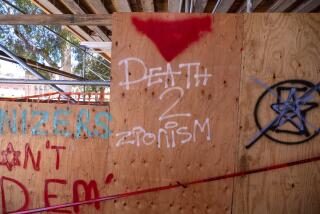The Struggle for Nationhood Fueled a Linguistic Revival
- Share via
JERUSALEM — Spoken Hebrew had been all but dead for 1,700 years when Eliezer Ben-Yehuda and his wife, Deborah, moved from Russia to Palestine in the late 19th century and decided to speak the biblical language in their new home.
Jews in Palestine spoke Yiddish, Arabic and the early Sephardic dialect Ladino in 1881. Hebrew was used for Jewish prayer and study, but it was nobody’s mother tongue. Yet Ben-Yehuda was determined to make it his children’s native language--and that of an entire nation.
Linguists ridiculed the idea, probably dismissing the obsession as mishegaas, the Yiddish word for craziness. Ben-Yehuda undoubtedly would have preferred to be condemned as shigaon--the Hebrew translation.
“Ben-Yehuda believed that Hebrew must be the language of the nation and that if Hebrew were revived, the nation would be revived,” said Gabriel Birnbaum of Israel’s official Academy of the Hebrew Language.
By the time Israel was founded in 1948, fully 60% of the Jewish population listed Hebrew as their first or main language, according to Birnbaum. Today, Hebrew is the native tongue of about 3 million Israelis, and millions of immigrants, Diaspora Jews and students of Judaism speak it as a second language. The early Zionists, who made a point of speaking the language, have given way to a generation that takes Hebrew for granted.
Such a linguistic revival has no known precedent and no subsequent match, Birnbaum said in an interview punctuated by telephone calls from an aide to the prime minister and others seeking advice on Hebrew spelling and usage.
The Hebrew dictionary today has 70,000 to 90,000 words, half of them from the original Hebrew and half from foreign-language roots--about the same proportion as English, Birnbaum said. Academia, incidentally, is one of the infiltrators.
Of the official Hebrew-based words, about 7,000 come from the Bible, 7,000 from Talmudic sources, 6,000 from works of the Middle Ages and about 14,000 from 18th century modern Hebrew literature.
Many ancient Hebrew words have modern definitions. The word kibbutz, for example, meant a group of people in biblical times but today is known as a cooperative agricultural or cultural settlement in Israel.
The original meaning of some biblical words has been lost. Hashmal, which appears in the book of Ezekiel describing his revelation of God, probably referred to something luminous, Birnbaum said. Now it is the Hebrew word for electricity.
Israelis eschew many Hebrew words, such as acca, for stress; they just say “stress” and consider it “Hebrew slang.” “The academy does not deal with slang. The members are happy there is Hebrew slang because it is a sign of a living language, but the academy is in charge of official language,” Birnbaum said.
But official Hebrew can be stuffy, and some words are so rarely used that people do not know them. Complaining that Israel’s economy was still too highly centralized, Prime Minister Benjamin Netanyahu once said that “there isn’t even a Hebrew word for ‘deregulation.’ ”
But there is. “He just didn’t know it or realize it,” Birnbaum said. “It is two words--hasarat hapikva. Roughly translated, it means ‘lifting control.’ ”
The Hebrew academy runs a three-hour hotline that gets about 30 to 40 calls a day, attracting everyone from Israeli lawmakers writing official texts to pregnant women in search of classic Hebrew names for their babies.
Ben-Yehuda and a group of like-minded Zionists founded the Hebrew Language Committee--the predecessor of today’s Hebrew academy--in 1890. Their movement gained momentum with the “second aliyah,” a wave of Jewish immigration beginning in 1904 that brought hundreds of thousands of Zionists from around the world to Palestine, where they required a common language. Unlike many immigrants who preceded them, these idealists were enthusiastic about making Hebrew the nation’s mother tongue. Many of them--men in particular--were familiar with written Hebrew and were not starting from scratch.
*
The Eighth Zionist Congress, meeting in The Hague in 1907, declared Hebrew the official language of the World Zionist Organization, and, within a few years, schoolchildren in Palestine were being educated in Hebrew--still a stiff and old-fashioned language with few textbooks.
“It took about 25 years to bring back the language. Maybe that doesn’t sound like a long time, but for people who wanted it very badly, it was a long time,” said Birnbaum. “If it were not for an obstinate man like Ben-Yehuda, they would have given it up. In the last years of his life, he saw Hebrew spoken. It was a fact.”
More to Read
Sign up for Essential California
The most important California stories and recommendations in your inbox every morning.
You may occasionally receive promotional content from the Los Angeles Times.












